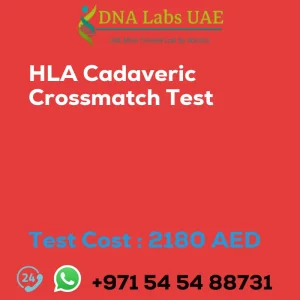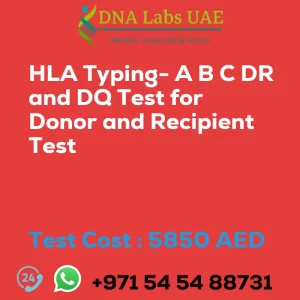CHIMERISM PRE-ENGRAFTMENT DONOR and RECIPIENT Test
Test Name: CHIMERISM PRE-ENGRAFTMENT DONOR and RECIPIENT Test
Components: PCR, STR / Fragment analysis
Price: 2340.0 AED
Sample Condition: 4 ml (2 ml min.) whole blood in 1 Lavender Top (EDTA) tube each for Donor and Recipient. Ship refrigerated. DO NOT FREEZE. Indicate Donor and Recipient on tubes appropriately.
Report Delivery: Sample Daily by 11 am; Report 7 Working days
Method: PCR, STR / Fragment analysis
Test type: Transplantation pathology
Doctor: Hematologist
Test Department: MOLECULAR DIAGNOSTICS
Pre Test Information: No special preparation required
Test Details
Chimerism pre-engraftment donor and recipient tests are diagnostic tests used in the field of transplantation medicine. These tests are performed to determine the level of chimerism in the recipient’s body after a transplant procedure.
Chimerism refers to the presence of two or more genetically distinct cell populations in an individual. In the context of transplantation, it refers to the presence of both donor and recipient cells in the recipient’s body after a transplant.
The chimerism pre-engraftment donor and recipient tests involve analyzing the DNA of cells from both the donor and recipient to determine the percentage of donor cells present in the recipient’s body. This information is important for monitoring the success of the transplant and assessing the risk of complications such as graft rejection or graft-versus-host disease.
The tests are typically performed using techniques such as polymerase chain reaction (PCR) or fluorescent in situ hybridization (FISH) to detect and quantify the presence of donor DNA in the recipient’s cells. These tests are usually performed multiple times in the early post-transplant period to track the level of chimerism over time.
A high level of chimerism indicates successful engraftment of the donor cells, while a low level may suggest graft rejection or other complications.
Chimerism pre-engraftment donor and recipient tests are an important tool in transplantation medicine for monitoring the progress of the transplant and making treatment decisions. They help healthcare professionals assess the overall health of the transplant recipient and tailor the treatment plan accordingly.
| Test Name | CHIMERISM PRE-ENGRAFTMENT DONOR and RECIPIENT Test |
|---|---|
| Components | |
| Price | 2340.0 AED |
| Sample Condition | 4 ml (2 ml min.) whole blood in 1 Lavender Top (EDTA) tube each for Donor and Recipient. Ship refrigerated. DO NOT FREEZE. IndicateDonor and Recipient on tubes appropriately. |
| Report Delivery | Sample Daily by 11 am; Report 7 Working days |
| Method | PCR, STR / Fragment analysis |
| Test type | Transplantation pathology |
| Doctor | Hematologist |
| Test Department: | MOLECULAR DIAGNOSTICS |
| Pre Test Information | No special preparation required |
| Test Details |
Chimerism pre-engraftment donor and recipient tests are diagnostic tests used in the field of transplantation medicine. These tests are performed to determine the level of chimerism in the recipient’s body after a transplant procedure. Chimerism refers to the presence of two or more genetically distinct cell populations in an individual. In the context of transplantation, it refers to the presence of both donor and recipient cells in the recipient’s body after a transplant. The chimerism pre-engraftment donor and recipient tests involve analyzing the DNA of cells from both the donor and recipient to determine the percentage of donor cells present in the recipient’s body. This information is important for monitoring the success of the transplant and assessing the risk of complications such as graft rejection or graft-versus-host disease. The tests are typically performed using techniques such as polymerase chain reaction (PCR) or fluorescent in situ hybridization (FISH) to detect and quantify the presence of donor DNA in the recipient’s cells. These tests are usually performed multiple times in the early post-transplant period to track the level of chimerism over time. A high level of chimerism indicates successful engraftment of the donor cells, while a low level may suggest graft rejection or other complications. Chimerism pre-engraftment donor and recipient tests are an important tool in transplantation medicine for monitoring the progress of the transplant and making treatment decisions. They help healthcare professionals assess the overall health of the transplant recipient and tailor the treatment plan accordingly. |








